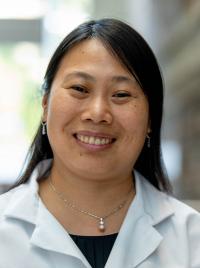
Dr. Stephanie Xie is a Scientist at Princess Margaret Cancer Centre. The Xie lab studies inflammatory and metabolic stress in human hematopoietic stem cells and leukemia stem cells. By understanding how stress promotes aging and cancer risk, the group aims to discover novel cancer prevention strategies.
Dr. Xie completed her Ph.D. in cell biology under the supervision of a leading expert in cell division, Dr. Peter Sorger, at the Massachusetts Institute of Technology. Her work in the Sorger lab focused on testing Theodore Boveri’s seminal hypothesis that abnormal chromosome number would be sufficient to drive tumorigenesis. She then undertook postdoctoral training at Massachusetts General Hospital in the laboratory of Dr. David Scadden, a preeminent expert in murine hematopoietic stem cells (HSCs). There she tackled the complex role of metabolic regulatory circuitry in HSC fate decisions at homeostasis and during aging. Her work has provided fundamental insights into basic cell processes in HSCs at the highest level including showing the importance of Lkb1 to enter and exit quiescence by altering lipid and nucleotide metabolism, independent of AML-activated protein kinase (AMPK) and mammalian target of rapamycin (mTOR). She also showed that HSC fitness during aging is dependent on the regulation of metabolic stress through the sirtuin Sirt3.
Following this work, Dr. Xie pursued further postdoctoral training with Dr. John Dick at UHN, who pioneered the xenograft transplantation assay and has made seminal findings on human HSCs and leukemia stem cells (LSCs). Her work revealed new insights into the role of lipid metabolism in human HSCs and LSCs with significant translational impact. She found that sphingolipids are distinct across the human blood hierarchy and inhibiting sphingolipid metabolism preserves HSC self-renewal during ex vivo expansion culture and thus has great translational implications to regenerative medicine. Mechanistically, modulating sphingolipids activates pro-survival proteostatic quality control pathways. Dr. Xie further discovered that modulating sphingolipid signaling was a novel leukemia therapy axis to target LSCs by potentiating inflammatory pathways and promote LSC differentiation in acute myeloid leukemia patient samples. Recently, Dr. Xie has been interrogating how inflammation ages human HSCs and the clinical implications to clonal advantage and cancer risk. She has been recognized for her work by the American Association of Cancer Research as a 2025 NextGen Star and currently serves on the American Society of Hematology Scientific Committee on Stem Cells and Regenerative Medicine.




 https://orcid.org/0000-0002-0284-494X
https://orcid.org/0000-0002-0284-494X